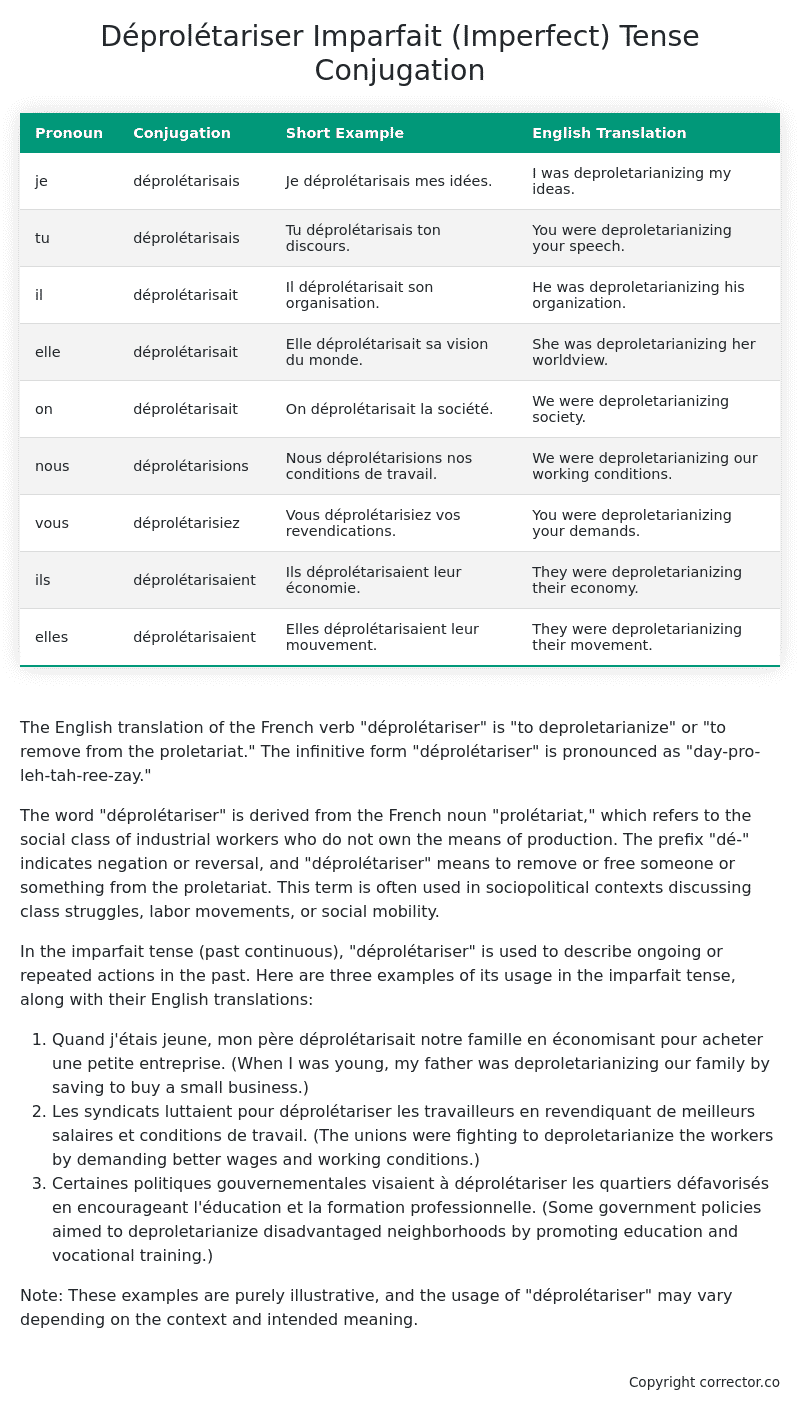Imparfait (Imperfect) Tense Conjugation of the French Verb déprolétariser
Introduction to the verb déprolétariser
The English translation of the French verb “déprolétariser” is “to deproletarianize” or “to remove from the proletariat.” The infinitive form “déprolétariser” is pronounced as “day-pro-leh-tah-ree-zay.”
The word “déprolétariser” is derived from the French noun “prolétariat,” which refers to the social class of industrial workers who do not own the means of production. The prefix “dé-” indicates negation or reversal, and “déprolétariser” means to remove or free someone or something from the proletariat. This term is often used in sociopolitical contexts discussing class struggles, labor movements, or social mobility.
In the imparfait tense (past continuous), “déprolétariser” is used to describe ongoing or repeated actions in the past. Here are three examples of its usage in the imparfait tense, along with their English translations:
- Quand j’étais jeune, mon père déprolétarisait notre famille en économisant pour acheter une petite entreprise. (When I was young, my father was deproletarianizing our family by saving to buy a small business.)
- Les syndicats luttaient pour déprolétariser les travailleurs en revendiquant de meilleurs salaires et conditions de travail. (The unions were fighting to deproletarianize the workers by demanding better wages and working conditions.)
- Certaines politiques gouvernementales visaient à déprolétariser les quartiers défavorisés en encourageant l’éducation et la formation professionnelle. (Some government policies aimed to deproletarianize disadvantaged neighborhoods by promoting education and vocational training.)
Note: These examples are purely illustrative, and the usage of “déprolétariser” may vary depending on the context and intended meaning.
Table of the Imparfait (Imperfect) Tense Conjugation of déprolétariser
| Pronoun | Conjugation | Short Example | English Translation |
|---|---|---|---|
| je | déprolétarisais | Je déprolétarisais mes idées. | I was deproletarianizing my ideas. |
| tu | déprolétarisais | Tu déprolétarisais ton discours. | You were deproletarianizing your speech. |
| il | déprolétarisait | Il déprolétarisait son organisation. | He was deproletarianizing his organization. |
| elle | déprolétarisait | Elle déprolétarisait sa vision du monde. | She was deproletarianizing her worldview. |
| on | déprolétarisait | On déprolétarisait la société. | We were deproletarianizing society. |
| nous | déprolétarisions | Nous déprolétarisions nos conditions de travail. | We were deproletarianizing our working conditions. |
| vous | déprolétarisiez | Vous déprolétarisiez vos revendications. | You were deproletarianizing your demands. |
| ils | déprolétarisaient | Ils déprolétarisaient leur économie. | They were deproletarianizing their economy. |
| elles | déprolétarisaient | Elles déprolétarisaient leur mouvement. | They were deproletarianizing their movement. |
Other Conjugations for Déprolétariser.
Le Present (Present Tense) Conjugation of the French Verb déprolétariser
Imparfait (Imperfect) Tense Conjugation of the French Verb déprolétariser (You’re reading it right now!)
Passé Simple (Simple Past) Tense Conjugation of the French Verb déprolétariser
Passé Composé (Present Perfect) Tense Conjugation of the French Verb déprolétariser
Futur Simple (Simple Future) Tense Conjugation of the French Verb déprolétariser
Futur Proche (Near Future) Tense Conjugation of the French Verb déprolétariser
Plus-que-parfait (Pluperfect) Tense Conjugation of the French Verb déprolétariser
Passé Antérieur (Past Anterior) Tense Conjugation of the French Verb déprolétariser
Futur Antérieur (Future Anterior) Tense Conjugation of the French Verb déprolétariser
Subjonctif Présent (Subjunctive Present) Tense Conjugation of the French Verb déprolétariser
Subjonctif Passé (Subjunctive Past) Tense Conjugation of the French Verb déprolétariser
Subjonctif Imparfait (Subjunctive Imperfect) Tense Conjugation of the French Verb déprolétariser
Conditionnel Présent (Conditional Present) Tense Conjugation of the French Verb déprolétariser
Conditionnel Passé (Conditional Past) Tense Conjugation of the French Verb déprolétariser
Conditionnel Passé II (Conditional Past II) Tense Conjugation of the French Verb déprolétariser
L’impératif Présent (Imperative Present) Tense Conjugation of the French Verb déprolétariser
L’impératif Passé (Imperative Past) Tense Conjugation of the French Verb déprolétariser
L’infinitif Présent (Infinitive Present) Tense Conjugation of the French Verb déprolétariser
L’infinitif Passé (Infinitive Past) Tense Conjugation of the French Verb déprolétariser
Le Participe Présent (Present Participle) Tense Conjugation of the French Verb déprolétariser
Le Participe Passé (Past Participle) Tense Conjugation of the French Verb déprolétariser
Struggling with French verbs or the language in general? Why not use our free French Grammar Checker – no registration required!
Get a FREE Download Study Sheet of this Conjugation 🔥
Simply right click the image below, click “save image” and get your free reference for the déprolétariser imparfait tense conjugation!

Déprolétariser – About the French Imparfait Tense
NOTE: To take a deep dive into all the French tenses then see our article on Mastering French Tense Conjugation.
Formation of the Imparfait Tense
For regular -er verbs:
For regular -ir verbs
For regular -re verbs
Common Everyday Usage Patterns
Description of Past Habits
Background Information
Mental and Emotional States
It’s employed to express emotions, thoughts, or physical sensations in the past. For example: “J’étais content quand il est arrivé.” (I was happy when he arrived.)
Ongoing Actions
Points to Note About the Imparfait Tense
Passé Composé vs. Imparfait
Conditional
Si Clauses
Narration
I hope you enjoyed this article on the verb déprolétariser. Still in a learning mood? Check out another TOTALLY random French verb imparfait conjugation!


